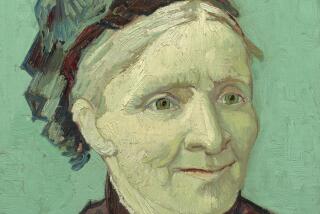Rich Legacy Left by ‘Poor’ Proponent
Only a handful of theater artists in the 20th century have had as profound an impact as Jerzy Grotowski. Indeed, the Polish director and thinker--who died in Pontedera, Italy, on Jan. 14 at age 65--leaves a legacy that’s more widespread than is generally known. There’s hardly a theater artist working today who hasn’t been affected, directly or indirectly, by Grotowski’s ideas.
Author of the germinal 1970 book “Towards a Poor Theater,” Grotowski is recognized principally for his ideas about acting. He was an essentialist who believed in a minimalist theatricality whose power emanates from the performer.
That, in fact, is what he meant by a “poor theater,” that the actor and a lone hypothetical audience member are all that are really necessary. Stripping the form to its essential components, he argued, heightens theater’s visceral impact.
Consistent with his belief in the primacy of the performer, Grotowski was one of the last great acting theorists. He was also arguably the first to articulate the technique of a highly physicalized performance style that is still, even several decades later, an inextricable part of the American experimental theater.
Based at his Laboratory Theater in Wroclaw, Poland (the city formerly known as Breslau, Germany), Grotowski both built upon and rejected Stanislavkian realism. He demanded that performers develop their physical and vocal capabilities to the point where they could use their bodies to convey deep-seated emotional truths--even to the point of harrowing audiences, if need be.
Grotowski’s goals, however, were never limited to aesthetics. He believed in acting--and by extension, theater--as a quasi-sacred process derived from ancient roots in ritual and worship.
*
It’s well known that Grotowski was a major influence on the likes of Peter Brook, Joseph Chaikin, Andre Gregory, Jean-Claude van Itallie, the Living Theatre, Mabou Mines and countless other stage luminaries who were also forging their artistic identities during the 1960s. In fact, it’s hard to think of a major figure among the American avant-garde who wasn’t shaped or swayed by the Polish director.
But Grotowski’s influence didn’t end with the ‘60s. A younger generation of artists who encountered him in the 1970s were equally affected. And while these artists--many of whom are only now reaching the peak of their creative powers--may not be as frequently identified as radicals as their 1960s predecessors, they’re every bit as dissident within the context of their own times.
There is, after all, a poor theater that thrives today, and it’s called performance art. Not surprisingly, a number of this genre’s most prominent practitioners were molded by Grotowski’s teachings.
Such artists are Grotowski’s spiritual and creative heirs and a key reason why theater manages to survive in this mediated age. And by his heirs, I don’t necessarily mean those artists who follow the letter of the late director’s methods and dictates, but rather those who harbor a passionate belief in theater as a forum for dangerous, iconoclastic, political experimentation.
Tim Miller, a co-founder of New York’s PS 122 and co-founder and artistic director of Highways performance space in Santa Monica--two of the United States’ most important performance art venues--is one such artist. (He’s also known to the general public as one of the erstwhile NEA Four, which is nothing if not a tribute to his Grotowskian radicalism.)
During the late 1970s while he was at PS 122, Miller worked with a group of artists who were also studying with Grotowski in Poland. The experience has helped shaped much of what he’s done since.
“I think the work that Jerzy Grotowski was doing at that time, the paratheatrical work described in the film ‘My Dinner With Andre’--experiential structures where there was no audience, just raw, pure human experiences that the performers helped facilitate--had a huge impact on me humanly and artistically,” he says.
“Grotowski’s work, along with other influences like punk rock and gay activism, called me to a more intense way of being human. It also asked my performance work to be more immediate, acknowledge the audience, work with them, play with them, challenge them.
“The work I do with groups is still powerfully informed by an experiential, more ritual, kind of theater that I explored when I was 19 and 20 with the extended Grotowski family in New York,” Miller says. “This work, of course, ended up being some of the genetic material in PS 122 and Highways.”
Grotowski may be gone, but the poor theater is alive and well in Santa Monica.
More to Read
The biggest entertainment stories
Get our big stories about Hollywood, film, television, music, arts, culture and more right in your inbox as soon as they publish.
You may occasionally receive promotional content from the Los Angeles Times.










